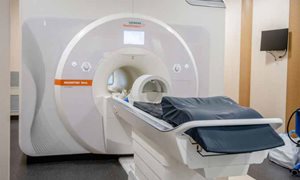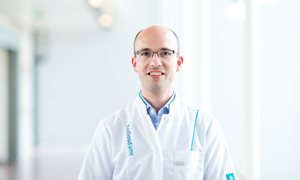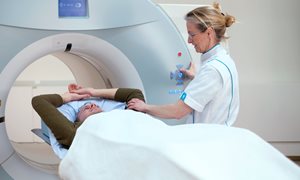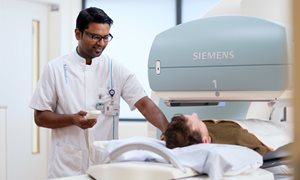
Artificial intelligence (AI) for diagnosing prostate cancer is now ready for clinical implementation, shows a global programming competition published in Nature Medicine. AI algorithms outperform the average pathologist, but when the computer provides a digital second opinion, the combination of AI and the pathologist is even more powerful. This is what PhD candidate Wouter Bulten shows in his thesis.
For diagnosing prostate cancer, the most common cancer among men, the microscopic analysis of prostate tissue by the pathologist is crucial. However, this process is subjective as pathologists frequently differ in their assessment. This has potentially major consequences for a patient. Wouter Bulten, a PhD candidate at Radboud University Medical Center, Nijmegen, The Netherlands, shows in his thesis that AI assesses prostate tissue at the level of experienced pathologists. He investigated this together with project leader Geert Litjens, on a dataset of over one thousand patients with prostate cancer of the Radboudumc, supported by the Dutch Research Council (NWO) and the Dutch Cancer Foundation (KWF).
PANDA Challenge
Based on this conclusion, Bulten, Litjens and their team, alongside Karolinska Institutet and Google Health, organized a large follow-up study known as the PANDA challenge. Their goal: to test whether computers can improve diagnostics on a global scale. Radboudumc and Karolinska Institutet merged their databases to build the largest publicly accessible dataset in pathology, with images from more than ten thousand prostate cancer biopsies. They challenged AI experts worldwide to, within three months, develop an algorithm for the digital analysis of prostate biopsies.
“We had more than one thousand participants,” Bulten explains. “Data, intermediate results, and discussion were accessible to all participants, allowing them to work together towards very powerful solutions. After ten days, one of the algorithms was already at the level of the average pathologist, and improved further. The developers of the three best algorithms received a cash prize. The top fifteen algorithms were included in a more extensive and independent analysis across multiple new and independent datasets. Thus, we’ve developed a blueprint for the large-scale evaluation of AI in pathology. AI based technology is now ready for clinical implementation.”
Superior
The PANDA study confirms the power of AI for diagnostics on a global scale. Will the computer soon replace the pathologist? Bulten: “I hear that question often in the media. I don’t think so. Our follow-up research shows that pathologists who use AI to diagnose prostate cancer perform better and more consistently. AI standalone outperforms the average pathologist, but the synergy of pathologists and AI combined is superior to either independently. Again, two know more than one.”
Bulten sees a vital role for AI in improving diagnostics: “Diagnostic quality improves when pathologists use AI as a digital second opinion, in particular less experienced doctors. Thanks to AI, we get better pathologists who diagnose cancers more consistently. AI can make medical care more affordable by speeding up diagnosis. Screening programs can benefit from AI through rapid tissue assessment so that pathologists can focus their attention on suspicious samples in particular.”
Workflow
How long will it take before AI is the standard in clinical practice? “We now need to demonstrate that more accurate diagnostics using AI improves outcomes for patients with prostate cancer, while decreasing healthcare costs. For this, we have to integrate AI into the existing diagnostic workflow. Only 10% of hospitals worldwide use digital images, with the other 90% still viewing biopsies through a microscope. This is one of the largest barriers to adoption of AI in clinical practice.”
According to the researchers, their algorithm can also show how aggressive a tumor is, the so-called grading of tumors. Supervisor Jeroen van der Laak: “Our algorithm, therefore, provides more valuable information. Aiosyn, a spin-off of the Radboudumc, is now working on software for various applications of AI in clinical pathology. This is how we create value for the patient.”
More information
On 28 January 2022 at 10.30, Wouter Bulten will defend his thesis titled ‘Artificial intelligence as a digital fellow in pathology: Human-machine synergy for improved prostate cancer diagnosis’. The live stream can be followed via this link.
The results of the PANDA challenge were published in Nature Medicine: Artificial Intelligence for Diagnosis and Gleason Grading of Prostate Cancer: the PANDA challenge. Wouter Bulten, Kimmo Kartasalo, Po-Hsuan Cameron Chen, Peter Ström, Hans Pinckaers, Kunal Nagpal, Yuannan Cai, David F. Steiner, Hester van Boven, Robert Vink, Christina Hulsbergen-van de Kaa, Jeroen van der Laak, Mahul B. Amin, Andrew J. Evans, Theodorus van der Kwast, Robert Allan, Peter A. Humphrey, Henrik Grönberg, Hemamali Samaratunga, Brett Delahunt, Toyonori Tsuzuki, Tomi Häkkinen, Lars Egevad, Maggie Demkin, Sohier Dane, Fraser Tan, Masi Valkonen, Greg S. Corrado, Lily Peng, Craig H. Mermel, Pekka Ruusuvuori, Geert Litjens, Martin Eklund & the PANDA Challenge consortium.
-
Want to know more about these subjects? Click on the buttons below for more news.
More information
Annemarie Eek

wetenschapsvoorlichter
Related news items

Arthritis drug use to limit antibiotics in blood cancer Drug Anakinra strengthens gut lining and inhibits inflammation
12 May 2022 Researchers from the University of Adelaide and the Radboud University Medical Center have repurposed an arthritis drug to restrict the use of antibiotics in the treatment of side effects caused by blood cancer, including leukemia, lymphoma and myeloma. go to page.aspx?width=800&height=534&ext=.jpg&type=BlockColumn1Zoom1)




